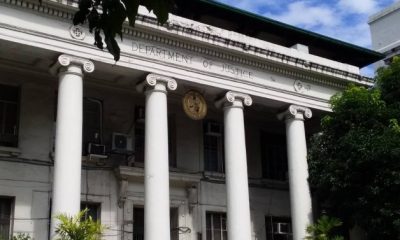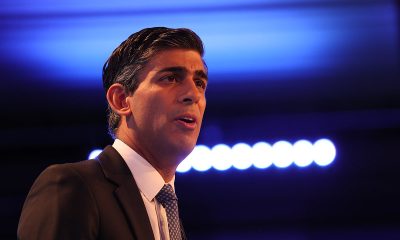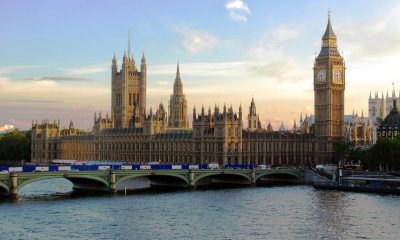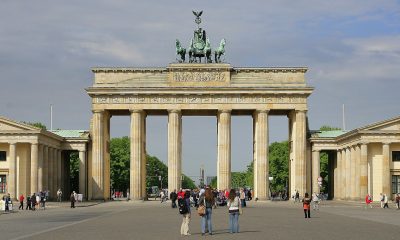Art and Culture
Correction: Cuba-Art elite Story
HAVANA (AP) — In a story June 10 about Cuban artists, The Associated Press reported a name erroneously. The founder and CEO of Troika is Dan Pappalardo, not Don.
A corrected version of the story is below:
Topsy-turvy laws, trendiness bring Cuban artists riches
Topsy-turvy laws and trendiness make Cuban artists some of the communist island’s wealthiest
By ANDREA RODRIGUEZ
Associated Press
HAVANA (AP) – Late one balmy spring night during Havana’s 12th Biennial, young working-class men and women lounged on a stretch of sand dotted with folding chairs and umbrellas, an artificial beach created as an art installation on the capital’s Malecon seaside promenade.
Meanwhile, at Sotheby’s auction house in New York, the beach’s 40-year-old creator, Arles del Rio, sold another piece featured at the last biennial for $11,875, more than 40 times the annual salary of an ordinary Cuban. The piece, titled “Fly Away,” is made of chain-link fence with a hole in the shape of a jet, making it appear the plane flew right through it.
Cuba’s growing international trendiness combined with the government’s topsy-turvy labor regulations are making sculptors, painters and other artists some of the richest people on the island. It’s a demonstration both of Cuba’s accomplishments in culture and education, as well as its economic difficulties after a half-century of communism.
“When I was in art school, my parents almost threw me out of the house because I hadn’t chosen a `real’ career,” said printmaker Max Delgado. “These days, there’s real competition among kids studying music or painting.”
Cuba allows its citizens to work in hundreds of types of private jobs outside the state-run economy but virtually none of those positions allow entrepreneurs to create real wealth. The island’s most potentially profitable business sectors and professions remain entirely under control of the state, which currently pays an average salary of a little more than $23 a month, or about $280 a year, in addition to the heavily subsidized health and other government services everyone gets.
But an exception was created at the end of the 1980s, when independent artists became some of the first Cubans that the government allowed to earn money outside the confines of the state and keep the profits from the direct sales of their work, sometimes for tens of thousands of dollars.
That has created a tiny class of artists who are wealthy by Cuban standards and can divide their time between the island and countries such as the United States or Spain. They can duck Cuba’s roughly 50 percent income tax on works sold outside Cuba.
Cuban economist Arturo Lopez-Levy, a lecturer at the University of Denver, said that under the island’s bifurcated economy most people earn puny state salaries while those with access to foreign money like the top-end artists can live like kings.
In the Sotheby’s auction two weeks ago, the works of Cuban artists surpassed expectations. One piece by Alexandro Arrechea went for $118,000, a lot of three pieces by a pair of artists who call themselves Los Carpinteros captured $60,000, and a sculpture by the artists’ collective “The Merger” got $50,000.
“This situation is due above all to the creation of a two-lane economy, with one sector connected to the market and another with the remnants of the command economy inherited from the 1970s, `80s and `90s,” Lopez-Levy said.
Along with medicine and science, art and music are fields in which small, poor Cuba punches far above its weight. While it treats medicine and scientific research as resources to be jealously guarded for the good of the nation, the government has seen artists and musicians as valued cultural ambassadors who are afforded special treatment.
The phenomenon is only expected to grow with warming ties between Cuba and the U.S. The detente is allowing more American visitors, including wealthy art collectors, to travel legally to the island on “educational” tours that often include the purchase of art, which can be legally exported back to the United States.
Organizers of the 2015 Biennial that opened May 22 have said they expect 2,500 Americans will visit this year’s fair, many of them art buyers, before it wraps up on June 22.
Dan Pappalardo, founder and CEO of Troika, an arts and entertainment marketing consultancy in Southern California, said Cuba is “is one of the most vital areas for contemporary art in the world today.”
“Growing hype around Cuba will likely attract collectors who are looking for the next big thing,” Pappalardo, himself an avid collector of Latin American works, said during a visit to Havana Biennial. “Some prices will go up, which is great for the artists. Some prices may go crazy, which is great for investment collectors but not always great for everyone else.”
Many of the visiting Americans are touring middle-class Havana neighborhoods dotted with immaculately restored homes where the artists live and have created private galleries of their work.
“Compared to the median they live very well,” Rafael Acosta de Arriba, an art critic and former head of the National Fine Arts Council, said of Cuba’s artists. “Cuban artists are very well compensated, but from abroad because in Cuba there is no domestic art market.”
Top painters, sculptors and other artists, for instance, are among the very few Cubans who regularly patronize high-priced private restaurants that cater mainly to foreigners.
For the artists themselves, the situation is a lucky combination of the quality of their art and an economy that has left them in a position of unexpected privilege.
“Cuban art is gaining fans,” Delgado said. “You can take advantage of earning at global prices and living and working here.”






















